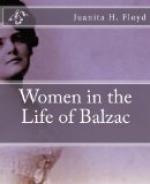Madame Carraud became the type of the femme incomprise
for Balzac, but the present writer is inclined to agree
with M. Serval when he calls this judgment astonishing,
since she was a woman who adored her husband and sons,
was an author of some moral books for children, and
nothing in her suggested either vagueness of soul
or melancholy. Madame Carraud herself gives a
glimpse of her married life in saying to Balzac that
she and her husband are not sympathetic in everything,
that being of different temperaments things appear
differently to them, but that she knows happiness,
and her life is not empty.
Often when sick, discouraged, overworked or pursued by his creditors, Balzac sought refuge in her home, and with a pure and disinterested maternal affection, she calmed him and inspired him with courage to continue the battle of life. It was indeed the maternal element that he needed and longed for, and Madame Carraud seems to have been a rare mother who really understood her child. He confided in her not only his financial worries, but also his love affairs, his aspirations in life, and his ideas of woman:
“I care more for the esteem of a few persons, amongst whom you are one of the first, both in friendship and in high intellect—one of the noblest souls I have ever known,—than I care for the esteem of the masses, for whom I have, in truth, a profound contempt. There are some vocations that must be obeyed, and something drags me irresistibly towards glory and power. It is not a happy life. There is in me a worship of woman, and a need of loving, which has never been completely satisfied. Despairing of ever being loved and understood as I desire, by the woman I have dreamt of (never having met her, except under one form—that of the heart), I have thrown myself into the tempestuous region of political passions and into the stormy and parching atmosphere of literary glory. . . . If ever I should find a wife and a fortune, I could resign myself very easily to domestic happiness; but where are these things to be found? Where is the family which would have faith in a literary fortune? It would drive me mad to owe my fortune to a woman, unless I loved her, or to owe it to flatteries; I am obliged, therefore, to remain isolated. In the midst of this desert, be assured that friendships such as yours, and the assurance of finding a shelter in a loving heart, are the best consolations I can have. . . . To dedicate myself to the happiness of a woman is my constant dream, but I do not believe marriage and love can exist in poverty. . . . I work too hard and I am too much worried with other things to be able to pay attention to those sorrows which sleep and make their nest in the heart. It may be that I shall come to the end of my life, without having realized the hopes I entertained from them. . . . As regards my soul, I am profoundly sad. My work alone keeps me alive. Will there never be a woman for me in this world? My fits of




